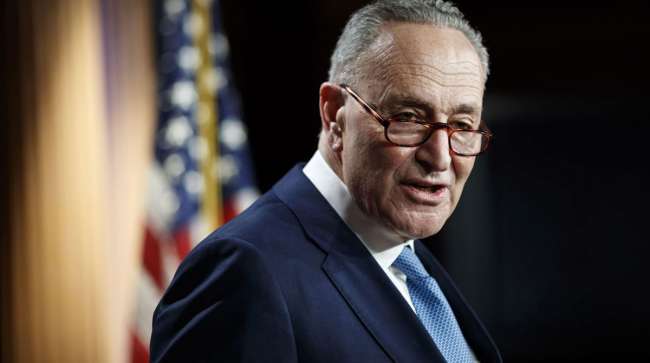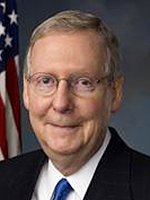Senior Reporter
Short-Term Funding Bill on Congress’ Fall Agenda

[Stay on top of transportation news: Get TTNews in your inbox.]
With members of Congress returning to Washington for their fall term, the leader of the U.S. Senate turned his eyes toward potential short-term federal funding that would avert a partial shutdown of government agencies by month’s end.
“We must fund the government before Sept. 30,” Senate Leader Chuck Schumer (D-N.Y.) told reporters on Sept. 7. The short-term bill would likely fund federal agencies through mid-December.
His House counterparts have expressed support for passing the continuing funding measure. Aides with knowledge of the congressional calendar recently told Transport Topics that congressional leaders intend to schedule debate on the continuing funding bill during the week of Sept. 12.

McConnell
Republican leaders have indicated support for the stopgap bill.
“As we look ahead, obviously the one thing we need to do is to pass a continuing resolution to take us to some date that will be, I guess, determined by the majority, past the election,” Minority Leader Mitch McConnell (R-Ky.) told reporters on Sept. 7. Nearly the entire federal apparatus is operating on funding authorized through Sept. 30. The need for the short-term funding legislation is linked to senators having not yet scheduled consideration of their fiscal 2023 appropriations bills. A fiscal 2023 transportation funding bill is among the dozen pieces of legislation Congress is tasked with approving for the upcoming fiscal calendar. Appropriations measures are Congress’ tools for funding agencies, such as the U.S. Department of Transportation.
Supplemental aid for foreign policy matters, such as the war in Ukraine, and relief provisions related to the pandemic and recent natural disasters are likely to be attached to the short-term bill. The White House recently asked Congress for $47.1 billion for such programs.
White House press secretary Karine Jean-Pierre recently told reporters the Biden administration’s supplemental funding request reflects “what we need to protect the American people, what we need to get things moving as we look at the different components here.”
“So we don’t see this as a difficult process,” she went on. “We’re going to, you know, make the case with Congress, we’re going to engage, we’re going to do meeting in person with bipartisan members of Congress from both the Senate and the House to talk about the consequences of inaction, to answer their questions, to make clear that we cannot afford to not act.”
“I think the key to getting the [continuing resolution] done with the least amount of controversy is for it to be as clean as possible,” McConnell added, alluding to keeping funding requests outside of the appropriations measure out of the process.
This work is ongoing as lawmakers consider other legislation. For example, the transportation funding bill introduced by Senate Democrats in July would dedicate $367.5 million for the safety operations and programs division at the Federal Motor Carrier Safety Administration. For the safety grants division at the agency, senators proposed $506.1 million. The Senate’s proposal for FMCSA matched the House-passed funding levels as well as the White House’s budget request.
Want more news? Listen to today's daily briefing above or go here for more info
Sen. Patrick Leahy (D-Vt.), chairman of the Appropriations Committee, said the transportation bill “makes critical new investments to improve our nation’s infrastructure and further implements the promises made in the bipartisan infrastructure bill enacted into law.”
Republican leaders, however, have criticized Democrats’ funding initiatives. “Like last year, Senate Democrats have unveiled partisan appropriations bills that spend billions more than even the administration’s wasteful request,” said Appropriations Committee ranking member Sen. Richard Shelby (R-Ala.). “These [bills] fail to appropriately allocate resources to our national defense, remove important legacy [policy] riders that enjoyed broad, bipartisan support just four months ago, and are filled with poison pills.”
Schumer stressed he’s hopeful lawmakers will be productive ahead of November’s midterm election. “There are many more things we’d like to get done,” he said. “We will work as hard as we can to accomplish as much as we can in this work period.”




